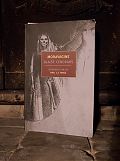
Blaise Cendrars
Moravagine
In no way can I begin to write of my latest reading without first mentioning Henry Miller’s frequent and exuberant praise for the writer Blaise Cendrars. Over and over Miller claims himself to be under Cendrars’ influence and I never knew why, until now. It has always been my intention to read Blaise Cendrars and I would have much earlier if his books came easily into my hands. (And I must heartily thank Kim and Ryan for providing me with this reading.) Immediately upon settling between Moravagine’s two covers, Cendrars’ written influence was self-evident. First some words from Henry Miller:
Cendrars has made it clear that the only teacher, the only model, is life itself. What a writer learns from Cendrars is to follow his nose, to obey life’s commands, to worship no other god but life. —Henry Miller, The Books in My Life
To believe Paul La Forge’s excellent introduction—and to believe Blaise Cendrars himself—Moravagine was the author’s double. Like a shadow he could not shake until this book was finished, Moravagine haunted him. Reading Moravagine I understood why; and I am happy that my ghosts are not so vicious. Moravagine, an idiot, a madman, a murderer and adventurer, locked into a psychiatric ward until a fine young doctor falls stricken for him, perhaps even obsessed, and releases him. One may suppose, after a whole life of some sort of captivity, that this is really not a good idea: murder sprees may follow and other general licentiousness.
You do well to hem me in with the hundred thousand bayonets of western enlightenment, for woe unto you if I leave the dark of my cave and set about in earnest to chase off your clamourings.
So we are taken by the narrator/doctor and Moravagine to the Russian Revolution of 1905, then to Texas, then to Amazonia, then back to Europe for War. It has a splendid effect for a book, these worldly adventures, this exciting life of action, as if they could not have done anything else, could not have seen anything more. Exhausting really, keeping up with Cendrars even in my imagination. Landscapes and characters vigorously populate this novel as places and people were passed by and through. A high life of exploits. Where the wind takes you!
The doctor, before hooking up with the hungry-for-life Moravagine, we must suppose was infatuated with his studies and led a quite boring and academic life. How to explain the strange attraction? And it was not only an attraction Moravagine held over the doctor, but also over others, like the terrorist group he basically ran and how he became king of an Indian tribe. There was some mesmerizing element to him—perhaps what held Moravagine in Blaise Cendrars all those years—for when the doctor and Moravagine are separated the doctor suffers a complex.
A transparency seems to dominate the two after awhile, one transparent for the other, Moravagine leading or not leading but going to wherever and whatever is next. A man of complete anarchy, Moravagine follows no other rules but his own. It would be easy to call Moravagine evil and I did whenever the subject of women came up or when he was ripping out their bellies; like a little devil sitting on his own shoulder and the narrator’s, dictating what atrocity would be next. But he acts without vengeance, without violence and that’s the way he is. An idiot with no other choice. An idiot? I guess, if Blaise Cendrars says so.
Who was Moravagine? I still don’t know.
What are you looking for? There is no truth. There’s only action, action obeying a million different impulses, ephemeral action, action subjected to every possible and imaginable contingency and contradiction. Life. Life is crime, theft, jealousy, hunger, lies, disgust, stupidity, sickness, volcanic eruptions, earthquakes, piles of corpses. What can you do about it, my poor friend?
· · · · · · · · · · · · · · · · · · · ·